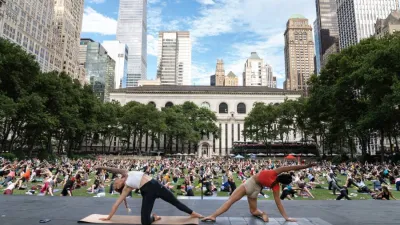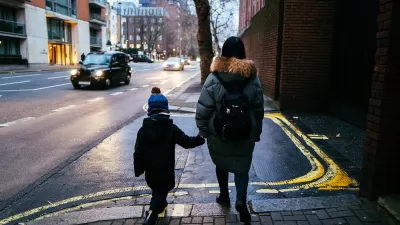Dr. Lawrence Frank (U. of British Columbia) et.al. looked at Atlanta to make the connection between health reform and transportation reform, devising a clever 'energy index'. While the index rose in denser neighborhoods, it didn't in mixed-use ones.
The results of the survey were surprising. Density without mixed use produced greater amounts of walking and biking than those with mixed use.
"Frank, Steve Winkelman of D.C.'s Center for Clean Air Policy, and Michael Greenwald of the Seattle-based firm Urban Design 4 Health used data from Atlanta's SMARTRAQ survey to map the amount of calories burned by various blends of walking, transit, and car use. That calorie-burning factor was dubbed the "energy index."
The "energy index" of Atlantans increased significantly as their neighborhoods grew denser, according to the study, and the number of calories they used on motorized travel shrank in denser, more walkable areas...In neighborhoods where mixed-use development grew, bringing housing closer to commercial property, the energy used for driving and walking decreased, leaving Atlantans' "energy index" unaffected."
"This result likely demonstrates that the energy required to travel in a very mixed land use pattern is lower for both walking and driving - with no real impact on the relationship between the two modes," the study's authors wrote.
From Streetsblog, Transportation Reform Is Health Reform:
"For every long-term $1 increase in gas prices, the national obesity rate drops by 10 percent, according to Courtemanche. That relationship goes a long way towards explaining why the House and Senate health care bills include "community transformation" grants to entice cities and towns into building bike paths, playgrounds, and other pedestrian-friendly improvements."
Thanks to Catherine Cecchi
FULL STORY: Study: Even in Car-Centric Atlanta, Transport Reform is Health Reform

Alabama: Trump Terminates Settlements for Black Communities Harmed By Raw Sewage
Trump deemed the landmark civil rights agreement “illegal DEI and environmental justice policy.”

Planetizen Federal Action Tracker
A weekly monitor of how Trump’s orders and actions are impacting planners and planning in America.

The 120 Year Old Tiny Home Villages That Sheltered San Francisco’s Earthquake Refugees
More than a century ago, San Francisco mobilized to house thousands of residents displaced by the 1906 earthquake. Could their strategy offer a model for the present?

Ken Jennings Launches Transit Web Series
The Jeopardy champ wants you to ride public transit.

BLM To Rescind Public Lands Rule
The change will downgrade conservation, once again putting federal land at risk for mining and other extractive uses.

Indy Neighborhood Group Builds Temporary Multi-Use Path
Community members, aided in part by funding from the city, repurposed a vehicle lane to create a protected bike and pedestrian path for the summer season.
Urban Design for Planners 1: Software Tools
This six-course series explores essential urban design concepts using open source software and equips planners with the tools they need to participate fully in the urban design process.
Planning for Universal Design
Learn the tools for implementing Universal Design in planning regulations.
Clanton & Associates, Inc.
Jessamine County Fiscal Court
Institute for Housing and Urban Development Studies (IHS)
City of Grandview
Harvard GSD Executive Education
Toledo-Lucas County Plan Commissions
Salt Lake City
NYU Wagner Graduate School of Public Service




























